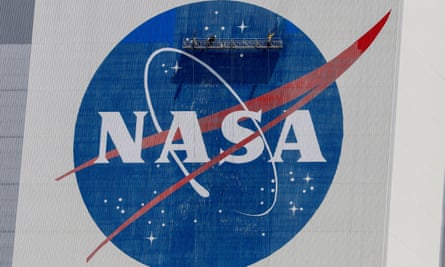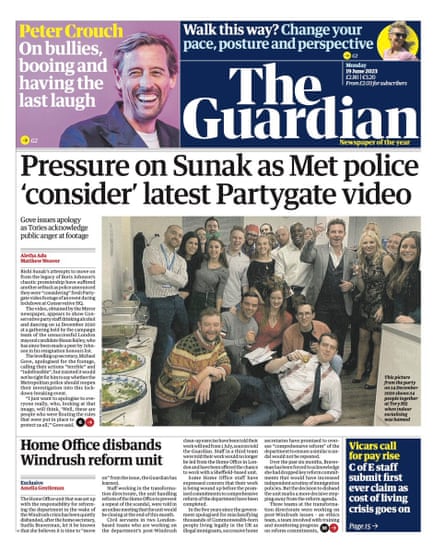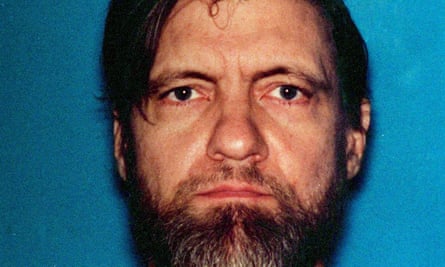Monday briefing: Why new claims about UFOs have experts wondering if the truth really is out there
Good morning.
As the world continues to be engulfed in metaphorical and literal flames, today’s newsletter focuses on something that is potentially a little more unearthly.
Unidentified flying objects, or unidentified anomalous phenomena (try saying that three times very quickly), are a gateway into a topic that has for decades been characterised by grainy footage and tinfoil hats. That is changing.
A little known website called the Debrief reported that a former intelligence official named David Grusch said that the US government has possession of “intact and partially intact” alien vehicles. Unlike previous whistleblowers who have been dismissed as unhinged or conspiracy theorists, Grusch has impressive credentials: he was a veteran of the National Geospatial-Intelligence Agency and the National Reconnaissance Office and led analysis on unidentified anomalous phenomena (the official term for UFOs). His claims were also supported by Jonathan Grey, a current US intelligence official at the National Air and Space Intelligence Center, who confirmed the existence of “exotic materials” to the Debrief.
At first, the revelations seemed pretty extraordinary. But in the week after the initial report, Grusch offered up more interviews in which he continued to make astonishing claims with no evidence, beyond that this information had come from “several sources”. Even though many are skeptical, the US congress is interested in hearing what Grusch has to say.
For today’s newsletter, I spoke to Greg Eghigian, a historian at Penn State University, who is writing a book on the history of UFO culture, to sort fact from science fiction. That’s right after the headlines.
Five big stories
-
Covid | A group representing the families of people who died of Covid-19 has expressed its disgust at a video that appears to show Tory party workers drinking alcohol and dancing during lockdown at a gathering at the Conservative party headquarters. The police have said they are “considering” the footage.
-
Conservatives | Dozens of Tory MPs are preparing to abstain from voting in the Commons on Monday over the parliamentary investigation that found Boris Johnson deliberately misled MPs. The former PM has urged his supporters not to vote against the committee’s findings.
-
India | At least 96 people died in two of India’s most populous states over the past several days because of a sweltering heatwave in which temperatures nearly soared to 45C.
-
Police | Suella Braverman has called on police to increase the use of stop and search powers “to prevent violence and save more lives”. In a statement aimed at all 43 forces in England and Wales, the home secretary said officers who used the powers had her “full support”.
-
Business | The Labour party has moved closer to ending its boycott of the Confederation of British Industry (CBI), which began because of a sexual misconduct scandal first exposed by the Guardian, in an early sign that steps to rehabilitate the crisis-hit UK lobby group may be working.
In depth: ‘Close to a majority of academics now believe UFOs warrant scholarly research’

America’s fascination with UFOs and extraterrestrials is deeply entrenched, with theories about government coverups and covert operations rife across the country. Initially, the claims made by Grusch fed this insatiable need to find out more about these mysterious objects and how much the government knows about them, so much so that the US House of Representatives launched an investigation into his claims. But as time has gone on, cracks have started to emerge and many are starting to wonder how accurate these claims really are.
How big is this story?
I’m going to have to disappoint you all from the outset: this is not quite the smoking raygun moment that changes the course of history. “At this point, it’s just a lot of second and third hand information,” Eghigian says. “The whistleblower has not said that he has seen any physical evidence himself or touched a ‘flying saucer’. He simply has said that he has seen some documents.” In short, this story does not quite pass the smell test. Grusch’s claims have also expanded since the original report in the Debrief, adding in subsequent interviews that the US had also found alien pilots and that some of the crafts were the size of an American football field (about three-quarters of a regular football field).
Despite adding these details, Grusch has failed to show any evidence nor said he has seen any of these things first-hand. The All-Domain Anomaly Resolution Office, an office within the purview of the Department of Defence set up to investigate UAPs, has denied all of the claims made by Grusch.
With all this in mind, Eghigian encourages caution, which is pretty characteristic given his academic background as a historian. He also points out that this pattern, of somebody who previously worked in some kind of federal department, coming forward with bombshell allegations, has been going on since the 1950s.
Eghigian is also skeptical about the veracity of these claims because it looks like Grusch followed Pentagon protocol in publishing this information, meaning that the Department of Defence approved the information he would pass on to the press, which is something the department only does if the information is not classified. If Grusch is telling the truth, surely this information would be classified, Eghigian says, and the department would not have allowed him to go on the record.
Growing interest in UFOs

Historically, research into UAPs has been relegated to the space of conspiracy theories, with scientists dismissing evidence as unreliable sightings made by eccentric hobbyists. But in the last six years, following the revelations from an explosive New York Times report that uncovered the existence of a defunct secret Pentagon program set up to investigate “unidentified flying objects”, there has been surging interest in rigorously and scientifically examining these objects.
“One big change is the involvement of Nasa – last week it set up a public panel alongside a committee and they are setting out a roadmap for looking into UAPs,” Eghigian says. “That’s unprecedented. Nasa, historically, wanted nothing to do with UFOs and the fact that these civilian scientists are asking scientifically informed questions, that’s new.”
This shift has helped legitimate interest in understanding and researching UAPs in universities as well: “I’ve seen in academia there is much more willingness for people to openly talk about investigating and studying this topic.” Eghigian has been to major conferences in the past two years, where the primary topic of discussion was UAPs. “Close to a majority of academics now believe that the study of UFOs warrants scholarly research. That’s a sea change.”
Eghigian attributes this transition in opinion to the fact that the US intelligence and military services have said that some of these UAPs are not optical illusions or computer glitches or result of mass hysteria. In 2021, the Pentagon released a report on UAPs which found more than 140 instances of UAP encounters that could not be explained. Officials at the time did not rule out the possibility that the objects are extraterrestrial.
Is it just an American obsession?
While it certainly feels like a “decidedly American” obsession, there are a number of other countries that have spent significant amounts of money, time and expertise on tracking down UAPs. France, for example, has had a state-run department (albeit a small one) dedicated to investigating unidentified objects. The UK and Denmark had one too but they were shut down due to budget cuts. “I think it’s fair to say however that the United States was always the major hub for the coverage of this phenomenon,” Eghigian concludes.
What might happen next?
The House of Representatives plans to hold a hearing on Grusch’s claims in the coming weeks, headed up by Republicans Tim Burchett, who appeared on a podcast with far right figure Steve Bannon to talk about UAPs, and Anna Paulina Luna, who believes the government has been lying to the public about UAPs for decades. So it seems that Grusch’s claims are resonating with a particular faction of congress that are prone to indulging in conspiracies.
For those more interested in evidence based research, curiosity about UAPs continues to grow. Eghigian predicts far more buy in from other academic disciplines: “We’ll likely see interdisciplinary research from a lot of different angles: scholars in social science, philosophy, religious studies studying this phenomenon, as well as the natural sciences.” This is a transitional period for the study of UAPs.
But, like everything else in academia, it will be a slow multi-pronged approach that does not yield the big “wow” moments that capture headlines. Until a flying saucer lands in front of the White House, that is.
What else we’ve been reading
-
Jane Drinkard’s report into why the beauty industry funnels money into anti-LGBTQ+ causes is a fascinating insight into performative allyship. Nimo
-
ICYMI: This extraordinary account of a man who knew nothing of the pandemic until his submarine surfaced after a tour of duty in 2020 is well worth your time: “We only found out two days before we were set to come back. The radio announced: ‘There is a deadly virus. It has arrived in France; you can’t leave your home.’” Toby Moses, head of newsletters
-
Melanie Sevcenko spoke to American doctors who have had to go out of state to get the relevant medical training in abortion procedures to become qualified. Nimo
-
Kathryn Bromwich writes powerfully about the importance of trans solidarity in the Observer: “Men continue to attack women and children at home, in the workplace and in public, often with no repercussions; they have no need to resort to impersonating trans women.” Toby
-
I loved Jonathan Nunn’s article on the battle to barbecue in a small, unremarkable park in south east London. Nimo
after newsletter promotion
Sport

Tennis | Andy Murray, pictured above, eased past Arthur Cazaux 6-4, 6-4 in Nottingham to secure his second consecutive ATP Challenger title on grass, extending his winning run to 10 matches over the past two weeks. His victory strengthens his hopes of positioning himself for a deep run at Wimbledon.
Golf | American Wyndham Clark won the US Open by one shot over Rory McIlroy on Sunday to claim his first major title. Clark sank a short par putt on 18 to finish the championship on 10-under par 270 behind an impressive display of power and precision.
Football | Luis Enrique, who left his post with Spain after the World Cup in December, is in advanced talks with Paris Saint-Germain about taking over as their new manager, succeeding Christophe Galtier. It is understood that the 53-year-old is expected to agree terms in the coming days as he closes in on a return to club management for the first time since leaving Barcelona in 2017.
The front pages

The Guardian starts the week with “Pressure on Sunak as Met police ‘consider’ latest Partygate video”. The Mirror has “Guilty party” and runs with a picture of two people dancing at the event that took place at Conservative headquarters during lockdown.
The i says “Banks told to help ease soaring cost of mortgages as rates rise”. The Mail says “Bank told to ‘wait’ before imposing another rate hike”. The Times reports on new plans to tighten housing rules for migrants, under the headline “Britons ‘to be priority on council house lists’”.
The Financial Times reports that “AstraZeneca drafts plans to carve out China business”. The Telegraph leads with “Starmer: I’ll push onshore wind to hit net zero”. Finally, the Sun leads with an alleged fight over Becky Vardy and Coleen Rooney’s legal bills: “Wagatha war over £1.8m”.
Today in Focus

The death of the Unabomber: will his dangerous influence live on?
Theodore “Ted” Kaczynski died earlier this month at the age of 81. Known as the “Unabomber”, Kaczynski waged a 17-year bombing campaign before finally being caught in 1996. One of those who helped apprehend him was former FBI agent Jim Fitzgerald. He tells Michael Safi that the arrest was only possible following the publication of the bomber’s manifesto in the Washington Post. It was those words that were recognised by Kaczynski’s brother, who took his concerns to the authorities.
But the publication of that manifesto had other consequences. It has inspired copycat attacks and is claimed as an influence by others who have gone on to commit atrocities around the world.
Cartoon of the day | Edith Pritchett

Sign up for Inside Saturday to see more of Edith Pritchett’s cartoons, the best Saturday magazine content and an exclusive look behind the scenes
The Upside
A bit of good news to remind you that the world’s not all bad

To mark the reopening of London’s National Portrait Gallery, which has been closed for three years for refurbishment, Guardian critics, artists and curators have picked their favourite works from its glut of brilliant portraiture. Among them, Sadie by Toyin Ojih Odutola, a new portrait of the writer Zadie (born Sadie) Smith, which was selected by gallery director Nicholas Cullinan.
Writes Cullinan, “Zadie Smith is one of the greatest literary voices of our time and Toyin Ojih Odutola is one of the most exciting artists, so this work is the perfect pairing. It’s also the first work by Toyin to enter a British public collection”. Elsewhere, writer and curator Rianna Jade Parker salutes Errol Lloyd’s 1986 painting The Domino Players (pictured above), a work, she writes, which evokes “a warm memory and a feeling of togetherness for many West Indians, at home and abroad”.
Sign up here for a weekly roundup of The Upside, sent to you every Sunday
Bored at work?
And finally, the Guardian’s puzzles are here to keep you entertained throughout the day – with plenty more on the Guardian’s Puzzles app for iOS and Android. Until tomorrow.
This article has been archived for your research. The original version from The Guardian can be found here.


